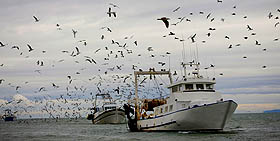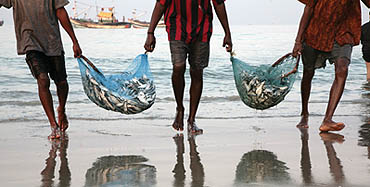Editor’s note
Two decades ago Donald Leal and Terry Anderson wrote “Homesteading the Oceans,” which appeared in the first edition of Free Market Environmentalism. They concluded the chapter by writing, “Establishing property rights to the ocean commons will not be easy, but like the frontier West, we can expect increasing efforts at definition and enforcement. Individual Transferable Quota (ITQ) systems offer a step toward facilitating property rights solutions.” Twenty years later there is good news and bad news.
As Leal explains below, the bad news is that the world’s fisheries are still in poor shape, both environmentally and economically. The good news is that rights-based management approaches are catching on and, as recently reported in Science, have the ability to halt and even reverse the global depletion of marine resources.
Through books, papers, and seminars for congressional staffers, and by working with groups such as the Environmental Defense Fund, Reason, and the Sand County Foundation, PERC has played an instrumental role in injecting rights-based solutions into ocean overfishing problems. When “Homesteading the Oceans” was published in 1991, there was one ITQ program in the United States for federally managed fisheries—today there are 15. The following provides an overview of this promising development.
Scarcely a week goes by in which we do not hear or read some distressing news about overfishing in ocean fisheries. Such news comes at a time when the world has witnessed a phenomenal productivity boom in agricultural use of land. There have been major technological advances in both arenas over the past half century, but the results of those advances differ markedly. In farming and ranching, technological advances have increased crop yields, raised product quality, and reduced production costs. In ocean fishing, however, technological advances have, for the most part, merely increased the ability of fishers to locate and catch more fish in less time. Little has been done to increase the seas’ natural fish production.
Why the difference? A vast literature on natural resource economics says it has to do with property rights. In simple terms, property rights are the formal or informal rules regarding use, ownership, and transfer of property. But they have to be much more than that in order to serve as a foundation for more efficient production and better stewardship in natural resource use. Specifically, property rights must be well defined, enforceable, transferable, and durable.

Because property rights in wild ocean fish stocks are not yet a reality, ocean fishers operate under a much different set of incentives. Specifically, they operate under the incentives of the commons, which leads to the well-known “tragedy of the commons”
Landowners also know that they can sell or lease all or part of their land to anyone, at any time. Such unencumbered transferability encourages owners to take into account how others value their property for ranching as well as other uses to which it might be put. Transferability also provides a powerful incentive for moving land to its highest-valued use. And because their property rights are held in perpetuity, ranchers have an incentive to take into account the future productivity of land when deciding present use.
Too Many Hooks in the Sea
Because property rights in wild ocean fish stocks are not yet a reality, ocean fishers operate under a much different set of incentives. Specifically, they operate under the incentives of the commons, which leads to the well-known “tragedy of the commons” scenario. Catching fish today means those fish will not have the opportunity to grow larger and to reproduce, yet fishers have no incentive to leave a fish because a fish left for tomorrow can be caught by others. Hence, the incentive is for fishers to ignore the future value of the resource and catch more than a sustainable amount of fish. In addition, each fisher can reap the full benefits of catching more fish while facing only a fraction of the depletion costs—these costs are shared among all fishers who exploit a fish stock. Such a distorted calculus further depletes marine resources.
For decades, government regulations dictating when, where, and how to fish have been the tool of choice in managing fisheries. Unfortunately, such an approach fails to instill in each fisher a regard for the future value of the resource, as a rancher has in owning land. Nor does it force each fisher to take into account the cost of taking one more fish. Moreover, a “regulated” commons still allows shares of the catch to be up for grabs, often leading to a destructive race for fish. In an effort to win the race for fish, each fisher is compelled to invest in bigger boats and more elaborate gear. Not only does fishing become wastefully expensive, but preventing overfishing through regulations such as shortened seasons and limits on fishing trips becomes problematic as the ability to catch more fish in smaller increments of time increases.
The results have not been good environmentally or economically. According to the United Nations Food and Agriculture Organization (FAO), about 28 percent of marine resources were “overexploited, depleted, or recovering from depletion” in 2008. In 1974, the percentage was reported to be 10 percent. In other words, the percentage of stocks in trouble increased by 2.5 times. A recent report by FAO and the World Bank estimates that the world’s fisheries lose an estimated $50 billion a year due to fisheries mismanagement. At a modest discount rate, this amounts to some $2 trillion in lost wealth over the last 13 years.
On the Bright Side
The good news is that there is a better way to manage an ocean fishery. A growing body of research reveals that fisheries that have adopted rights-based management strategies achieve sustainable catches and profits. As with other natural resources, the ideal approach is to establish well-defined, enforceable, and transferable property rights in the resource itself. But this approach has been slow to develop because, unlike land, most marine species are mobile and access is difficult to monitor. For now, specifying rights in either the harvest of fish or in the area of harvest has proven more feasible.
The most prominent of these rights-based approaches is individual transferable quotas (ITQs), which entitle a quota holder to catch a specific share of the total allowable catch set by fishery managers. The shares are also tradable. Another approach involves the fishers themselves structuring their own harvesting agreements, often resembling ITQs but privately administered. Yet another approach, well suited for species of limited mobility, is the establishment of exclusive harvest rights to marine areas. Economists have documented the economic benefits from implementing these approaches, such as higher fishing incomes, better product quality, and lower fishing costs. Using a global data base, scientists reported in Science in 2008 that such approaches have the wherewithal to halt and even reverse the global trend in stock depletion.
Once these approaches are adopted, the next phase of property rights evolution in fisheries may well entail the assumption of management rights and duties by fishers themselves. This has been a historical feature of some community-oriented coastal fisheries, and it has now emerged in New Zealand in some ITQ fisheries.
Overcoming Obstacles

The “freedom-of-the-seas” mind-set is another obstacle that still persists in many fishing communities; thus removing free and open entry to fishing grounds is often resisted. Another snag emanates from political agencies themselves, as their incentives work against relinquishing power over the fishery. More recently, resistance has taken on new dimensions, mostly from environmentalists, processors, and sportfishing interests, who perceive that their interests in the fishery are not adequately addressed in initial rights allocation.
The number of federal fisheries adopting rights-based approaches has grown from four in 1995 to 15 today.
The obstacles to property rights in the world’s fisheries remain formidable, but there has been progress. In the United States, a moratorium on ITQs in federally managed fisheries was imposed in 1996. Thanks to PERC research, education, and outreach as well as collaborative efforts with the Environmental Defense Fund, Reason Foundation, and fishing groups, Congress allowed the moratorium to expire in 2002. The number of federal fisheries adopting rights-based approaches has grown from four in 1995 to 15 today, with several more major fisheries in the planning stage.
At the global level, less than 2 percent of the world’s fisheries have adopted rights-based strategies. As it did for U.S. fisheries, PERC is carrying out research and working with partners to build momentum for rights-based fishing in developing countries in Africa. A recent PERC Political Economy Forum attracted internationally recognized experts who wrote papers on lessons learned in fisheries reform in developing countries. A final report will be out this summer with a published volume to follow.
All told, there has been slow but steady progress in evolving property rights in marine fisheries, and I am delighted to say that PERC has played an instrumental role in the process.





